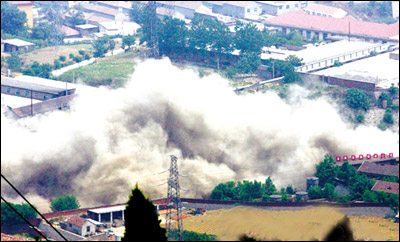| Home / Environment / Photo News | Tools: Save | Print | E-mail | Most Read |
| Coal-fired Power Plant Demolished to Cut Pollution |
| Adjust font size: |
A small coal-fired power plant in
Many local residents climbed up a nearby hill to witness the removal of three 50,000-kw generating units from Baiyanghe Power Plant, a subsidiary of China Huaneng Group, in the city of "Now at last these furnaces are gone," said 56-year-old Sun Guorui, who has lived in the city for more than 30 years. "They gave out a suffocating odor and all the nearby trees have been turned black." The Shandong Branch of China Huaneng Group, the country's major electricity producer, said it would replace the small, energy-guzzling coal-fired facilities with two 300,000-kw thermoelectric generating units that will cut energy consumption by at least 40 percent. "The new plant will save 270,000 tons of standard coal a year," said Zeng Xianfu, deputy general manager of the group's Shandong Branch. "Meanwhile, it will cut the annual emission of sulfur dioxide and dust by 10,400 tons and 42 million tons respectively." "We plan to close down coal-fired power plants with a combined generating capacity of 4 million kilowatts over the next four years, an estimated reduction of 120,000 tons of sulfur dioxide," said Fei Yunliang, head of the provincial development and reform commission. Closing down power plants that consume vast quantities of energy and emit severe pollution is a major component of the Chinese government's energy saving and emission control goals set for the 11th Five-Year Plan period (2006-2010). The power industry consumes one third of Coal-fired power plants, meanwhile, are to blame for one third of the total sulfur dioxide and half of the dust produced by the entire industry, according to the NDRC. Earlier this week, the NDRC ordered local authorities to remove preferential policies for energy guzzlers amid the nation's efforts to save energy and cut pollution. It warned local governments not to violate laws, regulations and policies by introducing preferential policies such as tax cuts to attract new high energy-consuming projects in the future. "Local governments should set stricter market access standards to help eliminate outdated production facilities and tighten land use and credit supply for new projects," the NDRC said on its website. The Chinese government has set a goal of reducing energy consumption per unit of gross domestic product by 20 percent by 2010 and pollutant discharge should drop by 10 percent. Energy consumption, however, fell only 1.23 percent last year, less than one third of the annual goal of 4 percent. Most of the high-energy industries, including steel, electrolytic aluminum and cement, saw a rebound in growth in the first quarter of the year after The six sectors of power, steel, oil refinery, chemicals, construction materials and metals consume 70 percent of energy for industrial use and release the same percentage of sulfur dioxide. The output of these sectors grew 20.6 percent in the first quarter, 6.6 percentage points higher than the same period last year, Chinese Premier Wen Jiabao said earlier this month. Wen pledged China would push forward reforms in the pricing of natural gas, water and other resources, raise the tax levied on pollutant discharge, establish a "polluter pays" system and severely punish those who violate the environmental protection laws. The premier said the economy could hardly be sustainable if (Xinhua News Agency May 30, 2007) |
| Tools: Save | Print | E-mail | Most Read |
 |
| Related Stories |
|
|||
